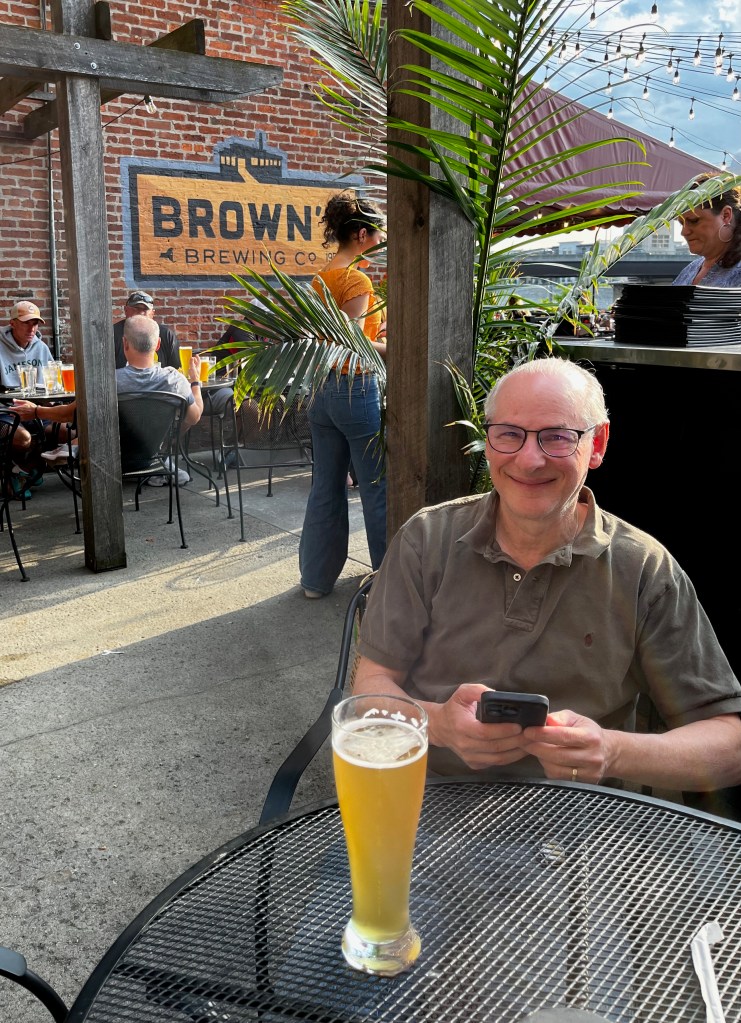Reading that there were chants of “Go back to Poland” at the pro-Palestinian encampments at Columbia University stopped me in my tracks. Weeks later my attempts to ignore it are not working. It is just too painful to try to pretend it didn’t happen.
The stunning ignorance and cruelty that this demonstrates is hard to swallow. Do they not understand what happened to Jews in Poland? This is personal to me. That statement could apply to American Jews, not just Israelis, after all we are hardly indigenous to the Americas. As an American Jew if I was forced to go back to Poland the only remnant of my family would be a monument to the 2500 people murdered in Halbow, Poland in 1942. My paternal grandfather’s parents and sister are buried underneath that monument in a mass grave. Luckily for my family, my grandfather went to America alone in 1921, long before World War II was on the horizon and before the thrall of Nazism. My grandfather was seeking his fortune and Jews were still permitted to immigrate. Millions of Jews in Poland were not so adventurous or prescient.
In addition to my family’s experience, we have the horrors my in-laws endured. They too lived in Poland, though today it is actually Ukraine or Belarus, which introduces another problem with their simplistic chant. Some of the Bakst family did indeed go to Israel after the war. Even if Ukraine or Belarus opened their arms to receive them today, it is not a viable alternative, or is the reason for that not obvious to those protesters?
I wrote about what happened to my father-in-law when he did go back to Iwie in 1944, while the war was still on but his town had been liberated by the Soviet army. I hope you will take the time to read my blog post about that here.
For purposes of this essay, I will summarize. David Bakst was granted leave for his heroism in a battle with the German army. At this point David was in the Soviet army who were unaware that he was Jewish. He was given leave to visit what was left of his family, his father and sister, who were in Lida, about 40 kilometers from his hometown. David pined for his home. He had warm memories of family gatherings and the love he felt among his extended family. The house was a relatively modern one, built in 1929. I think, even though it was unrealistic, he hoped in his heart to reclaim it.
They arrived at their home, which withstood bombing by Germany. A Polish family was living there. Though David was allowed to come into the house when he explained his connection to it, the reception was not warm. He was told in no uncertain terms that it wasn’t his anymore. Upon seeing the interior, with his family’s things rearranged, and seeing his parent’s bed, knowing his mother and younger sister had already been murdered, he collapsed in tears. His father and sister comforted him, they told him there was nothing in Iwie for them anymore, they needed to look to the future, and that is what they did.
David spoke fondly of that house for the rest of his life. But, whatever bitterness he may have harbored did not interfere with his making a new life in a new country.
Clearly the protesters at Columbia, at other college campuses and in the Middle East either don’t know this history or don’t care. If they don’t know it, they have a responsibility to learn it. The latter possibility is even worse. To be aware of the pain that is carried by our family and by millions of other Jewish families, and still chant “Go back to Poland,” is beyond cruel. It would be evidence of pernicious antisemitism, not of a liberation movement. It is also extraordinarily, epically ironic given that the basis of their protest is that Palestinians were forcibly evicted from their homes.
Another problem with this situation is that the media coverage of this has been quite limited. I have not seen stories that explain the problem with the suggestion that Jews go back to Poland. Those who are ignorant have not been enlightened by the coverage; they can continue to live in their deluded world. Does the media assume that people understand? If they understand, they should be called out for their inhumanity. While one might argue that the journalist’s role is not to take sides that is not what is called for here. It is a matter of giving context, explain some history and that is the role of a journalist. Giving that context doesn’t even necessarily mean folks would change their mind about the Palestinian cause, but it might help bring some nuance to the discussion. At the very least, hopefully that disgusting chant would be cast aside. I would not hope for apology, that is probably too much to ask, but it would be appropriate.
We can argue until the end of time about who the indigenous people of the Middle East are. Frankly, I don’t care beyond understanding the history of the region as best we can. We can argue who is in diaspora – aren’t both peoples? Not to mention other displaced persons who have been forced to leave their homes whether it is in Africa, Asia, or Central America because of war, gang violence, natural disasters, climate change, power struggles, genocides. Are these encampments for them too? Is there a point to arguing who is a refugee? Where does the argument get us? Yes, it is essential that we understand and acknowledge the generational trauma that Palestinians and Jews carry, but that is a two-way street. Chanting “Go back to Poland” is absurd and suggests that they are not serious about finding a solution.








